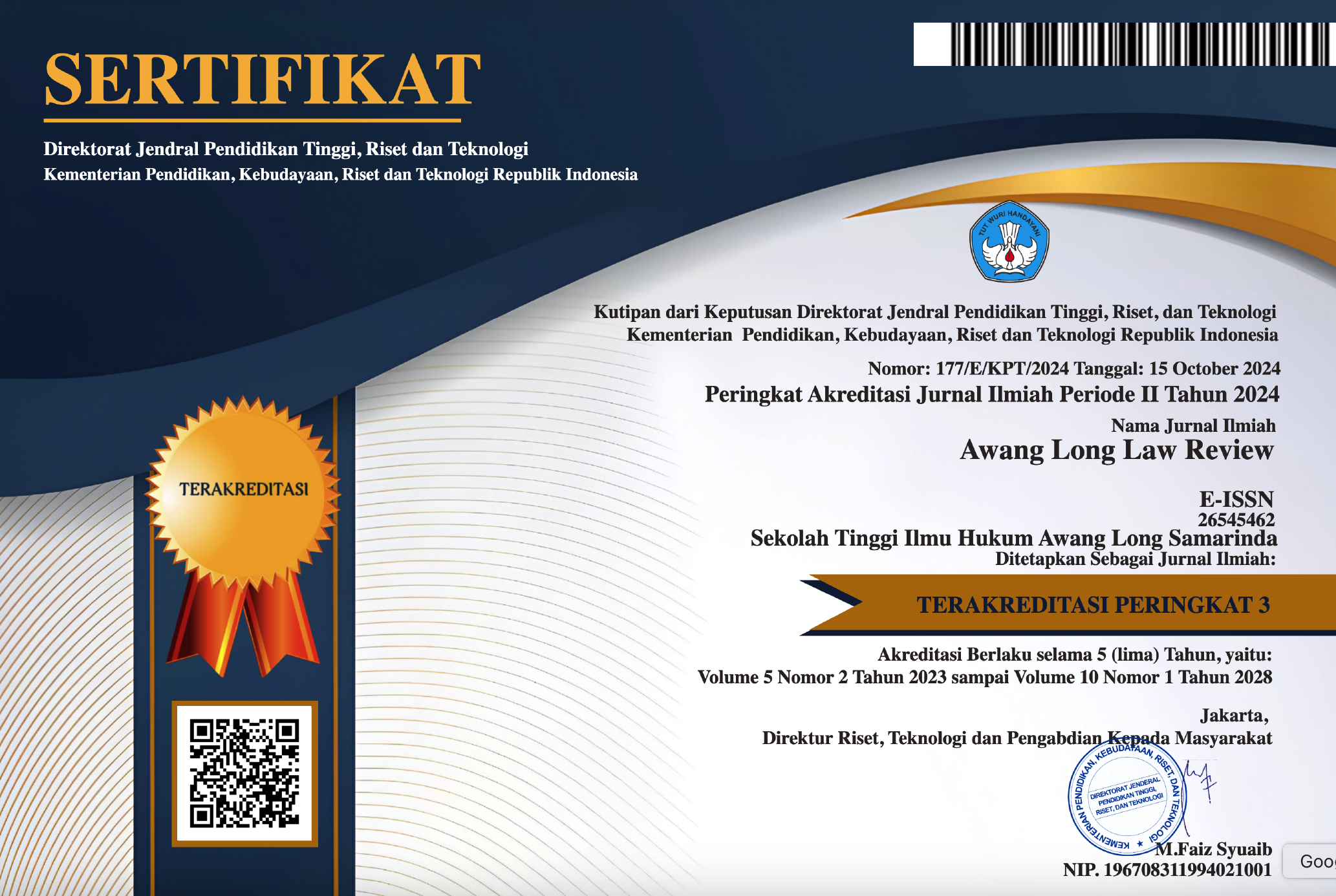DEVELOPMENT OF REGULATIONS ON VOTING RIGHTS PEOPLE WITH MENTAL DISORDERS POST-CONSTITUTIONAL COURT RULING APPLIED
Abstract
This research only focuses on the regulation of the right to vote in general elections, whether at the national or regional level, for people with mental disorders. The general paradigm is very varied regarding the mental condition of people with mental disorders. There is a crucial ambiguity regarding the intellectual capacity of people with mental disorders. The effect of the debate concerns granting them the right to vote as a constitutional right. This research aims to explore further the legal politics of regulating the right to vote for people with mental disorders in Indonesia. The research method used is normative legal research with a statutory and comparative approach. The results of this research show that people with mental disorders are subjects who are excluded from being granted the right to vote. This is confirmed in Article 57 paragraph (3) letter a of Law Number 8 of 2015. The meaning of this provision has shifted after Constitutional Court Decision Number 135/PUU-XIII/2015. Restrictions are granted only in cases of mental disorders and/or permanent memory according to mental health professionals who have lost the ability to choose. The ratio decidendi which is the argument is that the condition of people with mental and/or memory disorders is not permanent enough to eliminate their intellectual capacity to choose. As a result, people with mental disorders can participate in voting in national or regional elections as long as they are not declared by mental health professionals to be incompetent to vote.
Downloads
References
Amir, M., & Purnomosari, RD (2005). People's Representative Institution. Jakarta: Center for Constitutional Law Studies, Faculty of Law, University of Indonesia.
Arinanto, S. (2018). Human Rights in Political Transition in Indonesia. National Library of the Republic of Indonesia. Jakarta: National Library of the Republic of Indonesia. Retrieved October 26, 2023, from https://scholar.ui.ac.id/en/publications/hak-asasi-human-dalm-transisi-politik-di-indonesia
Asshiddiqie, J. (2006). Introduction to constitutional law volume II. Jakarta: Secretariat General and Registrar's Office of the Constitutional Court of the Republic of Indonesia. Retrieved October 26, 2023, from https://simpus.mkri.id/uploaded_files/temporary/DigitalCollection/MjZmYjgyZjZkZDI3NDVlODNkNjkyYWE4YTJjMWI5MjU1YTAwYTU0YQ==.pdf
Beckman, L. (2009). The Frontiers of Democracy: The Right to Vote and its Limits. Springer.
Campbell, D.F.J. (2008). The basic concept for the democracy ranking of the quality of democracy. Wien: The Democracy Ranking of the Quality of Democracy.
Dahl, R. A. (2001). On Democracy: Briefly Exploring the Theory and Practice of Democracy. translated by Rahmat Zainuddin. Jakarta: Indonesian Obor Foundation.
Diamond, L. (1996). Is the Third Wave over? Journal of Democracy, 7, 20. Retrieved from https://heinonline.org/HOL/Page?handle=hein.journals/jnlodmcy7&id=409&div=&collection=
Ferricha, D. (2021). HUMAN RIGHTS THE DIALECTIC OF UNIVERSALISM VS RELATIVISM IN INDONESIA. IAIN TULUNGAGUNG. Retrieved October 26, 2023, from http://repo.iain-tulungagung.ac.id/20453/
Kansil, CST (1974). Core general election knowledge: Lessons and basic knowledge about general elections for pupils/university students, based on Law no. 15 of 1969 concerning general elections, Government Regulation no. 1 of 1970 concerning the implementation of Law no. 15 of 1969, and regulations and guidelines for holding general elections. Pradnya Paramita.
Kekic, L. (2007). The Economist Intelligence Unit's index of democracy. The Economist, 21, 1–11. Retrieved October 26, 2023, from https://www.parlament.mt/media/59212/7522.pdf
Landman, T. (2018). Democracy and Human Rights: Concepts, Measures, and Relationships. Politics and Governance, 6(1), 48–59.
Constitutional Court, & Jember University. (2019). The Progressive Role of the Constitutional Court in Protecting the Voting Rights of Disabled People with Mental Disorders and Its Influence on Increasing Voter Participation in Elections. Jakarta: The Progressive Role of the Constitutional Court in Protecting the Voting Rights of Disabled People with Mental Disorders and Its Influence on Increasing Voter Participation in Elections.
Mahmud, PM (2016). Introduction to Legal Science Revised Edition. Jakarta: Kencana Prenada Media Group.
Manan, B. (1996). Popular Sovereignty, Human Rights and the Rule of Law. Jakarta: Pratama Media Style.
Nations, U. (nd). Universal Declaration of Human Rights. United Nations. United Nations. Retrieved September 22, 2023, from https://www.un.org/en/about-us/universal-declaration-of-human-rights
Nursyamsi, F., & Ramadhan, MN (2020). Protection of the Voting Rights of Persons with Mental Disabilities in a Series of Process Approach After the Constitutional Court Decision Number 135/PUU-VIII/2015. Adhyasta Election Journal, 3(1), 17–39. Retrieved October 25, 2023, from http://journal.bawaslu.go.id/index.php/JAP/article/view/25
Singh, A., & Badgaiyan, S. (2015). Legal Rights. International Journal of Law and Legal Jurisprudence Studies, 2(6).
Soerjono Soekanto and Sri Mamudji. (2007). Normative Legal Research An Overview. Rajawali Press, Jakarta.
Union, I. (1998). Democracy: Its Principles and Achievements. Inter-Parliamentary Union.
Wahyono, P. (1991). Civilizing the 1945 Constitution. Jakarta: Ind-Hill.
Widiartati, TR (2010). The Existence of Community Organizations Based on Pancasila Principles Viewed from a Human Rights Perspective (Thesis). University of Indonesia, Jakarta.
Copyright (c) 2023 Tanti Oktari

This work is licensed under a Creative Commons Attribution-ShareAlike 4.0 International License.







